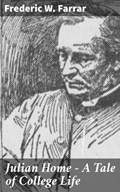In "Julian Home - A Tale of College Life," Frederic W. Farrar explores the formative years of young men navigating the complexities of university life in the mid-19th century. The novel is rich with vivid descriptions and flowing prose, capturing the essence of youthful aspirations, moral struggles, and the camaraderie of college friendships. Farrar artfully weaves themes of integrity, education, and the search for identity amid the trials and tribulations of academic life, all while invoking the social norms and pressures of Victorian society that shape the characters'Äô experiences. His keen insight into the emotional landscape of youth lends an empathetic depth that resonates throughout the narrative. Frederic W. Farrar, an esteemed Victorian scholar and clergyman, infused his own academic experiences into this semi-autobiographical work. Known for his advocacy for educational reform, he vividly portrays the tensions between individual ambition and societal expectations, drawing from the intellectual milieu of his time. Farrar, who was deeply influenced by classical literature and Christian ethics, sought to present a balanced depiction of the potential pitfalls and redemptive possibilities of college life.

